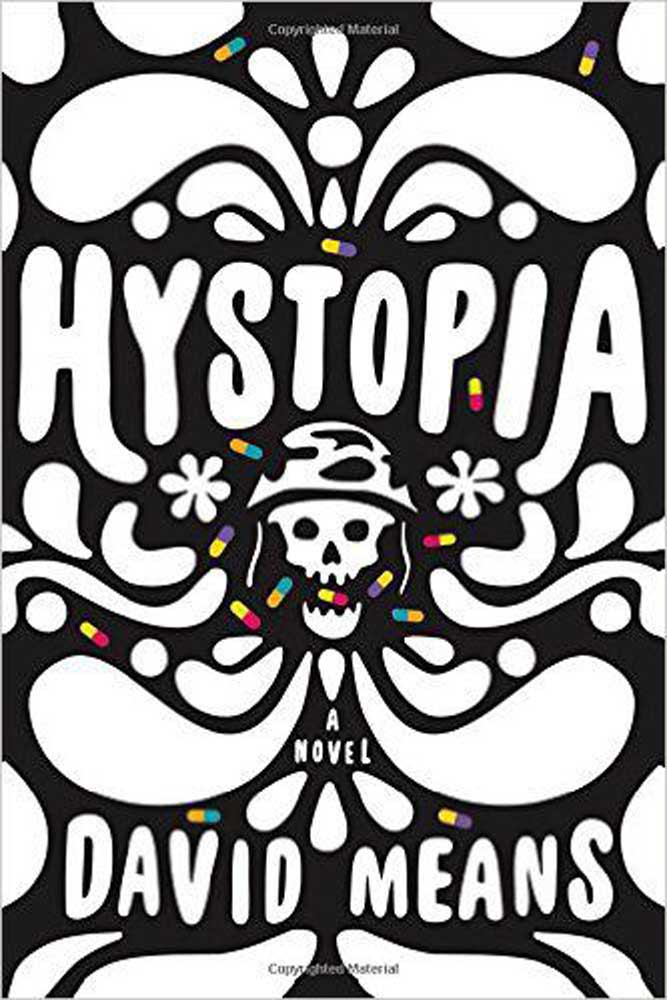David Means’ ‘Hystopia’ is not your average war novel
Published 12:00 am Sunday, April 24, 2016

- David Means’ ‘Hystopia’ is not your average war novel
“Hystopia” by David Means (Farrar, Straus and Giroux, $26)
“Hystopia,” David Means’ dark acid trip of a novel, reads like a phantasmagorical — and sometimes pretentious — mashup of David Foster Wallace’s “Infinite Jest,” Charlie Kaufman’s screenplay “Eternal Sunshine of the Spotless Mind” and Michael Herr’s Vietnam classic, “Dispatches.”
Trending
It’s a meditation on war (not just Vietnam, Means suggests, but the continuum of combat that links veterans throughout history) and the toll it takes on soldiers and families and loved ones. It’s also a portrait of a troubled America in the late 1960s and early ’70s — an America reeling from unemployment and lost dreams, and seething with anger, and uncannily familiar, in many ways, to America today. Perhaps most insistently, it’s an exploration of how storytelling — the causal narratives we manufacture in our heads — shapes our identities and provides a hedge against the chaos of real life.
These more cerebral aspects of “Hystopia” — the much-anticipated first novel by a veteran short-story writer — can weigh the book down, like too-heavy ornaments and garlands on a spindly Christmas tree. At the same time, the reader cannot help but admire its ambitions, and Means’ potent language helps power the story over its more lugubrious sections.
The book’s Nabokovian premise is this: We are reading a novel by a young Vietnam War veteran named Eugene Allen, who committed suicide; his novel, also titled “Hystopia,” is placed in context by a series of editor’s notes and comments from relatives, friends and acquaintances, who recount his tortured efforts to come to terms with his war experiences and the struggles of his mentally unstable sister, whose boyfriend died in Vietnam.
The counterfactual history of “Hystopia” transports us to a fictional America in the mid-20th-century. President John F. Kennedy has survived several assassination attempts and will be killed in 1970; fires set by rioters have burned through Detroit and Flint, Michigan, and rage and violence are spreading across the country, fueled by “the devaluation of the blue-collar worker, the destruction of factory infrastructure, and large numbers of wayward vets and minorities seeking justice.”
A controversial treatment called “enfolding” — involving the re-enactment of past events and a drug called Tripizoid — has been used on many Vietnam veterans to repress traumatic war memories; the treatment, Means writes, was “part of the Kennedy administration’s initiative to solve the mental illness ‘problem’ in general and the returning Vietnam vet problem in particular.”
Immersion in icy-cold water or orgasmic sex can suspend the enfolding process and prompt acidlike flashbacks, but subjects are warned: Remembering is dangerous. To know what’s up there in their heads would mean “you’re back in the horrific state you were in before you got the treatment.”
Trending
One vet whose trauma was amplified, not cured, by enfolding is Rake, a psychopath who has kidnapped a girl named Meg and gone on a murderous rampage across Michigan, parts of which are referred to as the lawless Zone of Anarchy. Hot on his trail are two members of the Psych Corps, known as Singleton and Wendy, who have also been scarred by the war. Wendy was once in love with Steve Williams, who lost his legs in Vietnam. Singleton experienced something traumatic there, too, but because he was enfolded, he cannot recall exactly what happened.
Eugene’s novel pivots around an inquiry as to how the histories of Singleton, Meg and Rake were entangled back in Vietnam — an inquiry that italicizes the essential role that memory (or its erasure) plays in an individual’s sense of self, and the sort of historical amnesia that can come to afflict a nation blundering deeper and deeper into a pointless war.
Eugene, and his characters, Rake, Meg, Singleton and Wendy, bear more than a passing resemblance to the alienated, isolated people who populate Means’ short stories (“The Spot,” “The Secret Goldfish”), just as the mythologized landscape of Michigan here — full of echoes of Hemingway, set to a soundtrack by Iggy Pop — will be familiar to many of his longtime readers. But the precision and control of the tales has given way in these pages to a shaggy-dog approach that’s part stream-of-consciousness, part apocalyptic conjuration, part analogy-laden metafiction.
The novel — both Eugene’s and Means’ — is not without its flaws. Their efforts to capture “the big, big picture, the one that goes forward in time and backward” and shows “the vastness of eternity,” can overpower the story, reducing the characters to specks moving across a literary landscape.
The dystopian, “Mad Max”-like storyline about damaged Vietnam vets like Rake gravitating to an increasingly violent Michigan has the unfortunate effect of suggesting that soldiers in general are troubled, “wayward souls,” prone to emotional instability.
And the novel’s myriad literary allusions and touchstones — in addition to those already mentioned, Vonnegut’s “Slaughterhouse-Five,” Faulkner’s “Absalom, Absalom!,” Nabokov’s “Ada,” the Terrence Malick film “Badlands” and Salinger’s Glass stories are also invoked — underscore the book’s more derivative, self-conscious tendencies.
“Hystopia” is at its most haunting not when it’s trying to fulfill its big, visionary aspirations but when it’s focusing on singular moments in its characters’ lives when hope and disappointment and loss converge — when Means is using his fierce, evocative prose not to try to forge a giant dystopian world but to capture individual men and women’s flailing efforts to make sense of “random, windblown, senseless events.”








